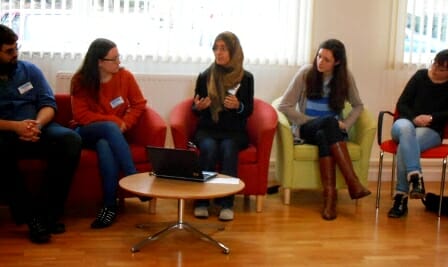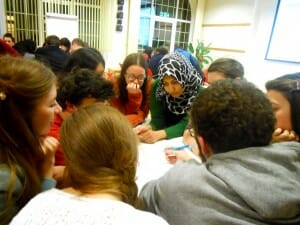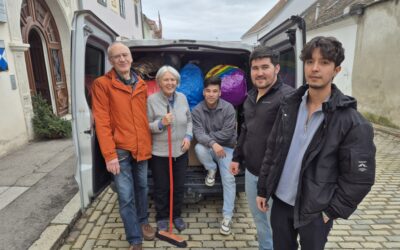 The group of 80 young Christians and Muslims. The topic: multiculturalism, religious diversity and dialogue. The question: Do you care? The format: to “Regenerate,” with two days at Hertfordshire, in a relaxed atmosphere where even burning issues were able to be discussed. The protagonists were young people from the Focolare Movement in Great Britain and Ireland and, this year, a group from the Islamic Unity Society with whom there has been growing friendship and mutual esteem, several projects, study sessions and planting peace trees. Participants listened directly to the experience of Dr Mohammad Ali Shomali, Director of the Islamic Centre of England, who spoke in video conference from Paris. He encouraged the group to “encourage opportunities of dialogue with everyone: dialogue is what characterises us as human beings. Accepting to dialogue with anyone who is different from us does not diminish us, but makes us more true to ourselves.”
The group of 80 young Christians and Muslims. The topic: multiculturalism, religious diversity and dialogue. The question: Do you care? The format: to “Regenerate,” with two days at Hertfordshire, in a relaxed atmosphere where even burning issues were able to be discussed. The protagonists were young people from the Focolare Movement in Great Britain and Ireland and, this year, a group from the Islamic Unity Society with whom there has been growing friendship and mutual esteem, several projects, study sessions and planting peace trees. Participants listened directly to the experience of Dr Mohammad Ali Shomali, Director of the Islamic Centre of England, who spoke in video conference from Paris. He encouraged the group to “encourage opportunities of dialogue with everyone: dialogue is what characterises us as human beings. Accepting to dialogue with anyone who is different from us does not diminish us, but makes us more true to ourselves.”  The honoured guest was Angela Graham who worked at BBC. Raised in Northern Ireland, she began from her own experience as she encouraged the young people to become “people of dialogue” within their own environments, trying to build bridges with people of other cultures and faiths. During the weekend of February 14-15, 2015 at the Focolare Centre for Unity which welcomed them in Welwyn Garden City there were workshops on the various topics: from interreligious dialogue to the social media; from politics to social commitment. “It’s quite striking to experience here people who are so passionate about living and working with God,” said Mohammed Mozaffari, one of the young Muslim men from the Islamic Unity Society. Lucia, from the Young for Unity group remarked: “The differences are not an obstacle, but an aid for building something together.” “Even those who had difficulty in identifying with a formal religion felt quite at ease, and builders like the rest of us,” say Nino and Mil who were among the organisers of the event. The event did not go unnoticed by civil leaders. Town Councilman, Michal Siewniak, stated: “It is encouraging to see young adults from different cultural and religious backgrounds becoming mutually involved in dialogue, and together looking for answers on how to live in harmony within a multicultural and multi-religious society.”
The honoured guest was Angela Graham who worked at BBC. Raised in Northern Ireland, she began from her own experience as she encouraged the young people to become “people of dialogue” within their own environments, trying to build bridges with people of other cultures and faiths. During the weekend of February 14-15, 2015 at the Focolare Centre for Unity which welcomed them in Welwyn Garden City there were workshops on the various topics: from interreligious dialogue to the social media; from politics to social commitment. “It’s quite striking to experience here people who are so passionate about living and working with God,” said Mohammed Mozaffari, one of the young Muslim men from the Islamic Unity Society. Lucia, from the Young for Unity group remarked: “The differences are not an obstacle, but an aid for building something together.” “Even those who had difficulty in identifying with a formal religion felt quite at ease, and builders like the rest of us,” say Nino and Mil who were among the organisers of the event. The event did not go unnoticed by civil leaders. Town Councilman, Michal Siewniak, stated: “It is encouraging to see young adults from different cultural and religious backgrounds becoming mutually involved in dialogue, and together looking for answers on how to live in harmony within a multicultural and multi-religious society.”
Don’t be discouraged by failure
Don’t be discouraged by failure




0 Comments